Almaty – Borat’s Land
“All people writing about Kazakhstan are telling bullshit!”
– Nurslan
Kazakhstan was surprisingly much more expensive compared to it was in my short visit in 2004. That time I stayed in Kazhol Hotel and it cost 26$/night. For my student pocket it was enormous amount. But staying in cold, dirty, dark room of Kazkontrakt was indeed uncomfortable and I decided to go back to Kazhol.
Kazhol now turned to be a very neat and smart hotel, after renovation. The tiles on the floor were glittering, as it was emphasizing the golden age Kazakhstan enjoying at this moment. The price also skyrocketed. The cheapest room now costs 69$. It was much beyond my budget.
I was told by some travelers that the cheapest option in Almaty was dormitory of the bus terminal (10$). But imagining staying in ‘dormitory’, especially in a bus terminal, the idea itself reminded me to many bad experiences of mine in Tajikistan. I preferred to invest just a little bit more, for my safety and comfort. But the problem is that ‘a little bit more’ was much more powerful than I thought to blow out my pocket.
I walked to a big boring block building named Hotel Zhetisu. This might be the cheapest option in town. The room I could get here, at the lowest price, was 40$ for a small closet with a tiny bed, gloomy and stinky, with similarly gloomy toilet and shower outside. It was not too bad, but the 40$ just did not worth it. I remembered an American friend of mine who was an expat in Almaty saying that Almaty was more expensive than his hometown in America. At least in America you get the quality of what you pay. In Kazakhstan you paid the same price for a third-world quality.
The weather was still grey like yesterday. Now it started to snow. Somehow the weather reflected my feeling. With empty head (after spending 40$ for the night), empty stomach (to keep the budget low after spending 40$ for the night), I walked through Almaty’s streets. The streets were straight: horizontal and vertical, making Almaty map resembled a patchwork of a mathematic notebook (tetrad).
In this city, despite of its wealth, you wouldn’t really see modern high rise buildings. The luxurious shopping center, Silkway Gipermarket (Hypermarket) on Tole Bi, the main road, was only 3 stories. It was neither big nor modern, but it offered expensive goods. There were perfume shops which sell expensive French imported sprays, or fashion clothes selling Italian most up-to-date fashions. Everything here was for up-market consumption. Even a pack of cold laghman and salad in the supermarket cost 5$ already. A Kazakh friend of mine bought two bananas and an apple – something you may get next to free in Indonesia – here cost 3 $. There was internet café as well and it cost 300T per hour, about 2.50$. For the rich Almaty dwellers, it was not big money as they still paid with coins (the smallest note of Kazakh money was 200 Tenge, about 1.40$). Kazakhstan was the first country which made me paying attention to every single coin I had in my pocket.
At night, I met a Korean friend of mine, Pasha. Almaty had quite big proportion of Koreans. In fact the city was very cosmopolitan. Here you could see kaleidoscope of ethnics: Kazakh, Kyrgyz, Uyghur, Uzbek, Tajik, Russians, Mongolians, Koreans, Chinese, Dungan, German, Hebrew, and all other minorities from Russia like Tatars, Udmurts, Siberians, Chukcha, etc. Pasha invited me to join two other Korean girls to a karaoke. The karaoke was Korean-owned and surprisingly it had collection of Indonesian songs as well. Don’t ask about the price. I was below poverty line in Almaty and for me everything, even a banana, was luxurious. Luckily the rich girls paid everything for us. We sang together. The girls studied Korean language in university and spoke Korean pretty well. Their fashionable appearance reminded me to middle class Chinese you might encounter in Beijing or Shanghai.
Then some Kazakh boys joined in the blue, dark karaoke room. The Kazakh, with their Mongoloid appearance and now with fashionable outfits, was not distinguishable from the Koreans. The girls then got drunk as the boys did. They started erotic gestures while singing. I was not used to nightlife, so I preferred to take a leave. Pasha insisted to go with me. But now was too late and there was no vehicle. Pasha said his house was far. What he did then was bribing the guard of Hotel Zhetisu to allow him to get in my single-bed room. That night I slept like a sardine.
Pasha had actually a mixed blood of Russian and Korean. His Russian mother, as he described as a monster, often involved in quarrel with him. The 27 year old Pasha didn’t spend much time with his father as his parents got divorced when he was very young .He didn’t speak Korean, as for most non-Kazakh in the country, Russian was the only language. He worked in oil-boom city, Atyrau, some thousands kilometers westward on Caspian shore. The city might be like Balikpapan in Indonesia in my imagination: full of oil businessmen, western expats, poor locals, and high cost of live. The big gap between those businessmen and poor local created a certain social jealousy. Pasha described Atyrau as dangerous city at night. Criminals were everywhere. Hotels were expensive. He claimed it was the most expensive city in the country.
Pasha helped me to find a cheaper place to stay. After traveling around the town, even with public buses which cost 40 Tenge per ride, I was tired and almost gave up. All budget options cost at least 30$ or more, and a single bed in a dirty dormitory cost 10$. Was Kazakhstan a really blood-sucker?
We arrived in Zelyonii Bazaar where, next to it, there were groups of ladies offering something written on white peaces of paper. Each of the ladies had a piece of paper on their hand. Later I knew that the ladies were offering apartment rental, for daily basis or longer term. Pasha made the negotiations for me and he came back with an old lady, who couldn’t stop talking about God. “Thank God,” she said, “yesterday I prayed to God. God, please send someone who really needs this my room, I said. And today God sent you here.”
“How much?” I asked Pasha.
“1000 T per day,” he answered, “but don’t worry, this lady is honest. She is devout Christian and she goes to the same church as I go. I don’t know her but I trust her.”
I couldn’t understand his logic, but anyway it was good offer.
The old Russian lady took us to her house. The journey was long, inside a local bus. In Almaty now you could see modern big buses and trams bustle the main roads. The buses were second hand buses imported from German. You even could spot some graffiti left by the ‘first hand’ in the bus, like ‘du meine’, or ‘ich liebe dich’. Whether they kept this graffiti untouched in the bus to show that this bus was proudly brought from Germany, or they don’t even bother to ‘sterilize the bus before us’ , was a mystery of me. Our bus passed through rows of houses, continued by other rows, again and again, until we reach her house in a complex near the airport.
The house was in poor housing outskirt of the city. The wooden apartment blocks queued in random order. Here were the homes of Almaty’s lower class, poorer and simpler, residents. I looked at my room. It was small but comfortable room with a spring bed and a curtain. For me it was more than enough, but Lyubova, the old Russian lady, kept apologizing for the simple room.
“We are religious, so we don’t watch TV. Sorry but we cannot provide a TV,” said her.
I didn’t know that there was a Christian sect forbidding the believers to watch TV.
Lyubova was unemployed. She was working as dezhurnaya, ‘lady-in-charge’, in a hotel. Her task was cleaning rooms and toilets. Now she was old and retired. Her hair was grey. But she was still strong. Everyday she went to the bazaar to offer her room in her house. There were actually only a bed room, a bath room, a guest room, and a kitchen in this apartment. Lyubova slept in the guest room, and Gregory, the 30 year old son, in the kitchen.
The son was unemployed. It was only Lyubova now earning money for the family, from renting out the simple room to strangers. This was a typical of low class Russian family in newly independent Central Asian countries. It was merely 10 km away from Almaty, but the sophisticated life of Almaty was something foreign here.
Lyubova was indeed religious. All the time she kept telling me about God, God’s love, and read for me some verses from bible. “If someone say ‘spasibo (thank you)’ to me, I would reply him ‘spasi Bog (thank God)’ because everything is from God,” was among few things that I could understand from her lengthy speeches in Russian. My limited Russian knowledge prevented me to understand more.
Later on that day, Pasha told me to the city and introduced me to some of his friends. They shared many stories. A friend of him, 24 year old Kazakh lawyer, told me a story about Breshnev, former Prime Minister of the Soviet Union. Breshnev had a habit of kissing everybody when he met. It was of his local culture (which was not common for a Russian) or his desire to kiss men, nobody knows. As he was the strongest man in the Soviet Union at his time, nobody was daring to refuse his lovely kiss. Only the Kazakhstan leader, said Pasha’s friend proudly, had the gut to avoid Breshnev’s tempting lips.
Another friend of Pasha was Kolya, a 24 year old musician. Kolya’s physical appearance, in my eyes, was very exotic. His eyes were narrow and long, and were slightly diagonal upward. It reminded me to pictures of Genghis Khan. But this young version of Genghis Khan was dressed in modern, neat Western outfit, and had a Korean movie star style haircut. Kolya’s homeland was indeed not far from Genghis’ homeland.
He came from Yakurtia near Siberia. People from there were known as ‘chukcha’, an ethnic which often becomes butt of jokes of other people in Soviet Union. There were many jokes to ridicule the poor Chukcha in Soviet times. The image of the nation was always poor and uneducated. I thought there should be something to do with history: the people in the west disliked people with similar appearance as Genghis Khan, as the Mongol hordes behaved barbaric when invading other nations. This attitude was still visible as well in Iran towards Asians (especially Afghans and Turkmens).
The night came. On Sunday night, Almaty’s public transport disappeared as early as 7 p.m. There was no way I could go back to Lyubova’s house without spending more than 10$ for taxi. “Don’t worry, we can go to a bar and there you can sleep for free,” suggested Pasha. I was not used to night life, but as it might be the only solution, what else I could say.
We arrived at the club about 11 p.m. Along the way we had to walk fast. Almaty, as well as other cities in Kazakhstan and Kyrgyzstan, was dangerous after dark. I spotted smog from sewage canals on the street. “That is the home for the homeless. The poor people with no housing spend the winter nights there,” said Pasha. Sleeping in canal holes. It was like the homeless life in London as a friend told me.
I was surprised that the bars I entered had more male guests and barely any females. Later I found out Pasha had brought me to one of Almaty’s several gay clubs. In Kazakhstan (as well as in Kyrgyzstan) homosexuality is not illegal, while it was still in Uzbekistan, Tajikistan, and Turkmenistan.
I couldn’t remember the last time I visited a bar. I have never been to a night club though, and my first experience in a night club was this gay club in Almaty. Luckily that today was Sunday night, a ‘quiet’ night. There were comparatively not too much guests. At midnight the party started.
There were some female guests as well and they joined the crowds of boys, dancing. I never danced. I sat at the corner and tried hard to sleep, but it was difficult due to loud music. Some young boys offered me free drinks, which I didn’t refuse.
I was involved in discussion with Nurslan, a 25 year old Kazakh boy who spoke very good English. He was drunk though. His words were meaningless, but I felt anger there.
“All people writing about Kazakhstan are telling bullshit!” He was talking about Borat, a recently booming American movie talking about Kazakhstan, ridicule to Kazakhstan as ‘great nation’. Borat story might be funny for people, but for Kazakh it was a humiliation. This country was indeed a new republic, with the most unclear identity in Central Asia. The Kazakh population was just recently passed the 50% line, and even that to separate ‘Russian’ identity from ‘Kazakh’ values was still difficult. But in anyhow, Kazakhstan was not as what Borat described of his ‘great nation’. The drunk Nurslan thought all foreigners now had the same perception of Kazakhstan, and they were all the same in term of deteriorating the name of his homeland, which then allowed him to burst all of his anger to me.
I didn’t argue with a drunk.
But I understood his feeling. Just imagine if Borat was replaced by a man named ‘Suprapto’ and the land in the movie was Indonesia. What will be your feeling? Kazakhstan is special, as it was a young country. In Kazakhstan most people never heard nor interested about Borat. But the minority people who have access to English websites or TV channels, and understand English, who learnt about this movie about, were divided into two groups. Some people were against, some people were supporting. You can check the website Anti Borat Website for humorous (likely fake attempts to sell T-shirts) protests against Borat. The Kazakh president, Nursultan Nazarbayev, even said he enjoyed the comedy of the movie, despite of the bad publicity (link)
Borat has made Kazakhstan very famous, it brought much-needed publicity to the country. You can spot nowadays how Kazakhstan, and in general the whole Central Asia, often be associated with ‘Borat’ in people’s daily speech. Most people in the world had never heard name of ‘Kazakhstan’ before the movie, and no need to mention they would know how Kazakhstan look like. After watching Borat, more and more people were interested to know about Kazakhstan, and it was the best time for Kazakhstan to promote the ‘real Kazakhstan’. We can see how aggressive Kazakhstan in promoting their tourism in world media, and recently it also got an award as best tourism promoting country in international forum (Indonesia was second).
The Russian music in the bar was very loud. I did hope I was in Borat’s land where there was no music at all. I tried hard to sleep but failed. When I returned back to Lyubova’s in the morning, she almost cried when seeing me. She worried something bad happened to me so I didn’t come back. She was afraid I was robbed or something. She didn’t sleep the whole night, just wait for me – a paying guest in her house.
I felt guilty to her. But I just couldn’t tell her I spent the whole night in a gay bar.

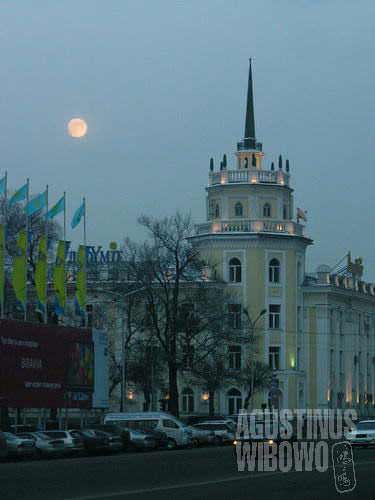

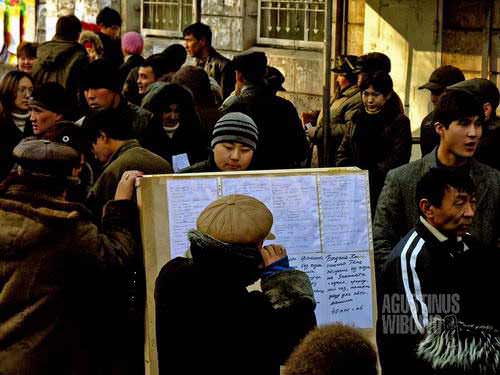
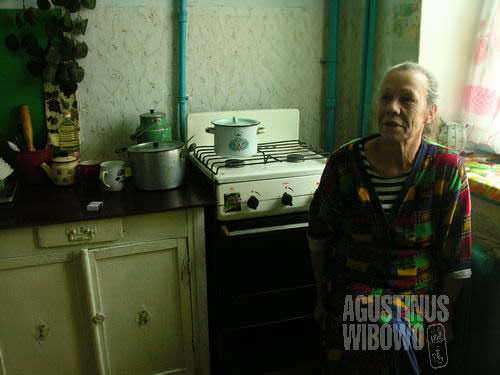
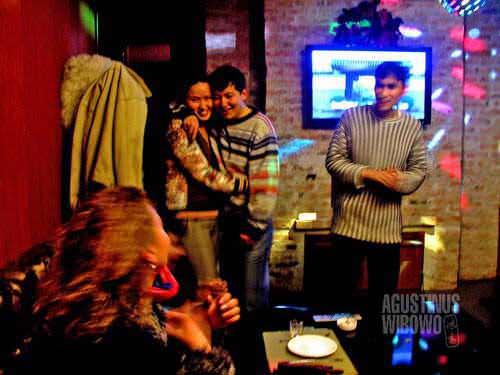
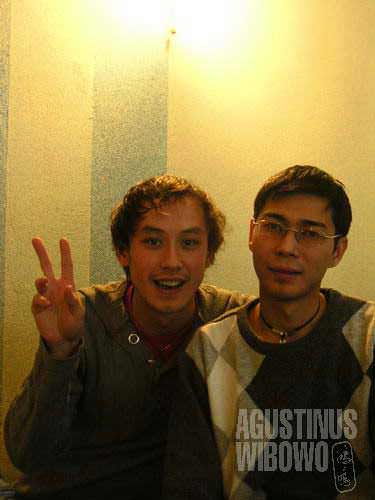
Leave a comment